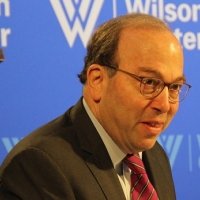Angola at 40 Years: Progress, Challenges, and the Way Forward
On November 18th, 2015 the Wilson Center Africa Program, in conjunction with the U.S.-Angola Chamber of Commerce and the Embassy of the Republic of Angola, hosted “Angola Day,” a full-day event focused on “Angola at 40 Years: Progress, Challenges and the Way Forward.” The event included three panel discussions and multiple keynote remarks, bringing together 16 diverse sector experts—including prominent Angolan and American political figures, a range of company heads doing business in Angola, and a selection of activists and academics—to discuss Angola’s past, present, and future. Since gaining independence on November 11, 1975 and the end of its civil war in 2002, Angola has worked to establish itself as a leader on the African continent and in the global arena, holding roles such as Executive Secretariat of the Gulf of Guinea Commission, Presidency of the Kimberly Process, and Non-Permanent Member to the United Nations’ Security Council. On the domestic front, Angola has made significant progress in consolidating peace, but still faces developmental, political, and social challenges. For example, according to Transparency International’s most recent Corruption Perceptions Index, Angola has one of the world’s highest perceived levels of corruption, ranking 161 out of the 174 countries surveyed. In the day’s first panel discussion, “Angola at 40 Years: Independence, Peace, National Unity, and Development,” panelists discussed Angolan political and social issues, focusing particularly on the significance of Angola’s 14 years of peace, as well as the importance of expanded human rights, increased civil liberties and strengthened democratic institutions as requirements for Angola’s continued growth. Throughout the day, speakers stressed the importance of Angola’s status as one of three U.S. strategic partners in Sub-Saharan Africa, acknowledging the countries’ common economic and security interests in the region. Due in large part to its vast mineral and petroleum reserves, Angola has also had one of the fastest growing economies in the world. Despite this economic growth, broad-based economic development still eludes most of the population and income inequality and poverty remain serious issues of concern. Per a 2014 United Nations report, Angola was ranked 93 out of 137 for overall progress on the Millennium Development Goals. The event’s second and third panels, “Angola’s Economic and Business Prospects” and “Achievements, Challenges, and Prospects in the Private Sector,” focused on doing business in Angola, and the state of the country’s economy. Panelists agreed that Angola must work to diversify its oil-dependent economy in order to survive recent declines in global oil prices, suggesting agriculture and tourism as alternative revenue-generating sectors. Additionally, panelists discussed Angola’s investment potential, agreeing that while investments can prove extremely fruitful, barriers to the ease of doing business in Angola pose a considerable challenge. Recent reforms to increase the attractiveness of doing business in Angola are underway, with Angolan officials remarking on their desire to further open Angola to international businesses. See the full webcast of the event above, or read highlights on the @AfricaUpClose Twitter.
Speakers


Hosted By

Africa Program
The Africa Program works to address the most critical issues facing Africa and US-Africa relations, build mutually beneficial US-Africa relations, and enhance knowledge and understanding about Africa in the United States. The Program achieves its mission through in-depth research and analyses, public discussion, working groups, and briefings that bring together policymakers, practitioners, and subject matter experts to analyze and offer practical options for tackling key challenges in Africa and in US-Africa relations. Read more
